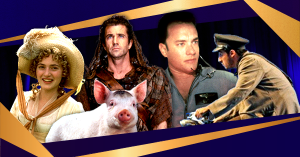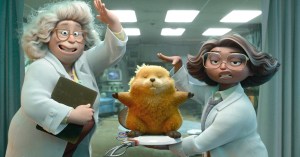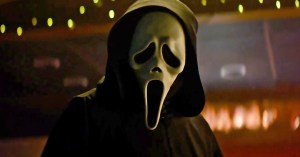Total Recall: Best Judd Apatow Productions
With Funny People hitting theaters, we run down the multi-hyphenate's finest work.
They may not have as much control over a film as they did during the days of Hollywood’s studio system, but producers still wields a great deal of clout, and despite the behind-the-scenes nature of the job, a great producer can draw audiences to a movie just as powerfully as a name director or major star. One such current producer is Judd Apatow, whose name has become a signifier for a certain brand of smart (and thoroughly bankable) comedy; since producing Anchorman: The Legend of Ron Burgundy in 2004, he’s been on an impressive roll, one he hopes to continue with this week’s Funny People.
Of course, Apatow isn’t just a producer; he’s also a director and writer, and Funny People — like Knocked Up and The 40-Year-Old Virgin before it — finds him occupying all three positions. Still, it’s his list of production credits that runs longest — and may contain a few surprises for those who haven’t been following his career closely — so we thought this would be the perfect time to give each of them the Total Recall treatment. We did get a little technical, and cut out the films where he served as an executive producer (bye bye, Heavyweights, Celtic Pride, Kicking and Screaming, and The TV Set) as well as associate producer (thus excising 1992’s Crossing the Bridge). Don’t worry, though — that still leaves us plenty to discuss. Ready to get started? It’s Total Recall time!
12. Year One
Well, it sounded good, anyway. Teaming up hyperactive Jack Black and deadpan Michael Cera for a Monty Python-inspired spoof of the Old Testament — with Harold Ramis behind the cameras and The Office‘s Gene Stupnitsky and Lee Eisenberg helping with the screenplay? Laughs galore, right? Well, not so much. At 16 percent on the Tomatometer, Year One is one of the bigger critical duds of the year so far, despite its stellar behind-the-scenes pedigree, two likable leads, and a supporting cast that includes such dependable comedy vets as David Cross, Paul Rudd, and Hank Azaria. What went wrong? It really depends on who you ask — some scribes pinpointed a lack of chemistry between Black and Cera, some simply found the movie dull, and some just couldn’t abide by the script’s aggressively lowbrow humor. As Eric D. Snider of Film.com wrote, “If you can’t take this premise and these actors and come up with anything funnier than Jack Black eating poop, then you have no business making comedies.”
11. Drillbit Taylor
Even if it had been the comedy of the year, 2008’s Drillbit Taylor would have been overshadowed by the public personal breakdown suffered the previous year by its star, Owen Wilson; in fact, the studio was reportedly so protective of Wilson that his promotional tour for the film was curtailed to the point that it probably would have dampened its gross no matter how solid the reviews or word of mouth might have been. Of course, as it turned out, Drillbit was dead on arrival anyway — it might have been based on an idea from John Hughes, but audiences and critics found this quickly forgotten comedy, about a homeless man who pretends to be a mercenary in order to scam some kids out of enough money for a ticket to Canada, a few shades less appealing than Pretty in Pink. As the Houston Chronicle’s Amy Biancolli put it, “Watching kids being forced to pee on each other isn’t actually funny. Neither is watching those same kids get chased down by a pair of thugs in a sports car.”
10. The Cable Guy
With loads of dark humor and a plot that took subversive aim at the entertainment industry, 1996’s The Cable Guy might have been a nifty little low-key comedy, if not for one thing: the obsessively reported $20 million paycheck that Jim Carrey took home for playing the title role. With Carrey’s rep and that kind of money at stake — not to mention Ben Stiller behind the cameras — Cable Guy had plenty of lofty expectations to meet when it arrived in theaters. As you probably remember, things didn’t exactly turn out as planned; critics were divided by its rough blend of grim laughs and Carrey’s trademark mugging (Chuck O’Leary of Fantastica Daily called it “hilarious”; Variety’s Leonard Klady deemed it “hopelessly disconnected and ultimately unsatisfying”), while American audiences didn’t show it the kind of love they’d had for, say, The Mask. Though it eventually turned a profit, earning more than $100 million worldwide, The Cable Guy went down as one of the black sheep of 1996’s theatrical flock — and for whatever reason, it would be eight years before Apatow produced another movie.
9. Step Brothers
In most of his comedies, Will Ferrell plays a doltish man-child who has somehow managed to get past his obvious mental shortcomings to succeed in some wildly inappropriate career field — NASCAR, figure skating, network news. But for 2008’s Step Brothers, Ferrell and screenwriting partner/director Adam McKay dispensed with those niceties and simply developed a story about two unemployed nincompoops in their late 30s who are forced to confront their unwillingness to grow up (but not before spending an hour and change tormenting one another with disgusting pranks and physical violence). It was, in other words, the perfect setup for Ferrell and co-star John C. Reilly — and just the kind of film that you’d expect to pile up a $185 million worldwide gross while causing critics like Bruce Demara of the Toronto Star to call it “a movie of unrelenting idiocy featuring boorish behaviour, unrealistic character development and ludicrous plotting.” Still, some scribes got the joke, among them Tom Long of the Detroit News, who wrote, “Do not go to Step Brothers looking for anything remotely meaningful, sincere or spiritually enhancing. Go for a laugh. It’s got plenty of them.”
8. Anchorman: The Legend of Ron Burgundy
A cheerful combination of scatological improv, 1970s spoofery, and utter nonsense, 2004’s Anchorman: The Legend of Ron Burgundy proved two things: One, that Will Ferrell can be as ridiculous as he likes and still make money at the box office; and two, that there is always an audience for non sequitir gags like “I love lamp.” Its nearly $100 million gross also helped Apatow transition from critically revered but low-rated television shows into top-grossing feature films, and kicked off a prolific, profitable run that has grown to boast some of the most successful comedies of the last 10 years. Not bad for a movie whose final act rests on a conversation between a dog and a bear, right? Surprisingly for such a lowbrow movie, most critics were just as caught up in Anchorman‘s silly spell as audiences; though some were dismissive of its largely one-joke premise, the majority agreed with Stephen Hunter of the Washington Post, who decreed, “you will laugh. Then you will laugh some more. Then you will laugh still again.”
7. Pineapple Express
Apatow may have said it was inspired by Brad Pitt’s character in True Romance, but spiritually, 2008’s Pineapple Express is more of a cross between a Cheech & Chong flick and a quintessentially 1980s buddy action movie like Running Scared. It’s an inspired blend, to be sure — one rife with enough possibilities to transcend the occasional flabby spots in Seth Rogen and Evan Goldberg’s script, or a running time that may have been 20 minutes too long. Though most critics weren’t exactly bowled over by the Express, they were at least charmed enough by Rogen and James Franco (starring, respectively, as a cheeba-loving process server and his dealer) to nudge the movie into Fresh territory. Some scribes rejected it outright (Richard Roeper likened watching it to “sitting dead sober in a room with a bunch of stoned people who are laughing uproariously”), but Time’s Richard Corliss spoke for the majority when he called it “a comedy that brings a nicely deflating note of realism to action-film mayhem, as well as being one of the few drug movies you don’t have to be high to enjoy.”
6. Talladega Nights: The Ballad of Ricky Bobby
Take Will Ferrell’s SNL impression of George W. Bush, put him behind the wheel of a racecar, and you’ve got the basic ingredients for 2006’s Talladega Nights: The Ballad of Ricky Bobby — as well as a smash Certified Fresh hit that reunited many of the creative principals behind 2004’s Anchorman with similarly proudly stupid results. Whether Ferrell and Adam McKay meant to salute the red state NASCAR crowd or lampoon it was a subject of debate for some critics, but audiences seemed to be too busy laughing to care, and the film has gone on to acquire a level of cult status, both within the sports world (NASCAR driver Carl Edwards copied Ricky Bobby’s signature move when he crossed the finish line on foot at Talladega this year) and without Dallas rapper B-Hamp scored a minor hit with a song titled “Do the Ricky Bobby.” As Kenneth Turan of the Los Angeles Times wrote, “Talladega Nights: The Ballad of Ricky Bobby is a bit of a mess, but it is a genial mess, and one that will make you laugh. Which is the whole idea.”
5. Walk Hard: The Dewey Cox Story
Judd Apatow productions are known for their skillful use of humor that feels real — sometimes squirm-inducingly — so the news that he was co-writing and producing a mock biopic of a legendary musician named Dewey Cox (and that Cox would be played by the mercilessly funny John C. Reilly) was greeted with enthusiasm by critics and fans hungry for more 40-Year-Old Virgin-style laughs. Ultimately, expectations for Walk Hard: The Dewey Cox Story proved slightly unreasonable; although critics applauded the film, sending it to Certified Fresh status with a commendable 76 percent Tomatometer rating, moviegoers chose not to follow Apatow down this particular path, and it failed to recoup its budget. Still, despite being one of Apatow’s rare commercial misfires, Walk Hard is one of the better-reviewed entries on his resume, and boasts the approval of no less a critical luminary than Roger Ebert, who applauded its restraint when he wrote, “instead of sending everything over the top at high energy, like Top Secret or Airplane!, they allow Reilly to more or less actually play the character, so that, against all expectations, some scenes actually approach real sentiment.”
4. Forgetting Sarah Marshall
As the title of his latest feature suggests, Judd Apatow knows funny people — and he has a knack for working with his comedic leads at exactly the right time. After helping Steve Carell and Seth Rogen cross over to superstardom, Apatow added his magic producer’s touch to Jason Segel’s breakout feature, 2008’s Forgetting Sarah Marshall, which deftly combined the elements we’ve come to expect from Apatow-branded comedies (painfully real humor, uncomfortable nudity) with utterly unique ingredients (singing vampire puppets). The results proved, once again, that if they’re assembled properly, movies that skirt the rim of lowbrow humor can squeeze a couple of hours’ worth of laughs out of even the most highfalutin critics. In his review, the Wall Street Journal’s Joe Morgenstern echoed Sarah Marshall‘s many accolades when he wrote, “Halfway through I realized that I’d lost most of my standards, maybe under my seat, and was enjoying the erratic evolution of the nonsense.”
3. 40-Year-Old Virgin
Judd Apatow seemed to come out of nowhere with 2005’s The 40-Year-Old Virgin, his directorial debut — but the reality, of course, is that his ascension was far more gradual; he landed his first associate producers’ credit with 1992’s Crossing the Bridge, and his name surfaced throughout the ’90s and early aughts in connection with projects both well-received (The Larry Sanders Show, Freaks and Geeks, Undeclared) and, well, not (Celtic Pride, The Cable Guy). But Apatow’s signature brand of comedy didn’t really reach full bloom until Virgin — and its awkward pauses, creative profanity (“Kelly Clarkson!”), and off-the-wall pop culture gags (Asia! Michael McDonald!) arrived at the perfect moment for a moviegoing public starved for smart adult humor. The result left Steve Carell with a new level of fame, made Judd Apatow a household name, and helped resurrect the R-rated comedy. It didn’t do too badly with critics, either; Bill Muller of the Arizona Republic was solidly in line with the sentiments of his peers when he wrote that Virgin was “a nostalgic, sentimental and wholly bawdy comedy that will make you laugh until your sides hurt.”
2. Superbad
Having been a staunch supporter of Seth Rogen’s from their days together on the set of Freaks and Geeks, Apatow was already well acquainted with Rogen’s comedic talents even before they teamed up to make a ton of box office cash with Knocked Up — which doubtless had a lot to do with why Apatow was interested in producing Superbad, a high school loss-of-virginity flick in the grand tradition of Fast Times at Ridgemont High and American Pie. Superbad‘s premise, which teamed Jonah Hill and Michael Cera with newcomer Christopher Mintz-Plasse on a quest to secure booze for a house party, may have been embarrassingly familiar, but Rogen and his writing partner, Evan Goldberg, nonetheless managed to squeeze fresh laughs (and plenty of ticket receipts) from it — not to mention kudos from critics like the San Francisco Chronicle’s Mick LaSalle, who wrote, “for pure laughs, for the experience of just sitting in a chair and breaking up every minute or so, Superbad is 2007’s most successful comedy.”
1. Knocked Up
Schlubby dudes that inexplicably manage to score with babes have been a comedy staple for decades, on screens both small (Newhart, According to Jim) and silver (everything Woody Allen has ever done). Into that rich tradition stepped 2007’s Knocked Up, Apatow’s wildly successful directorial follow-up to The 40-Year-Old Virgin, which paired rumpled slacker Ben Stone (Seth Rogen) with gorgeous E! Network employee Alison Scott (Katherine Heigl) for a look at what can happen when you head to a club, have a few too many drinks, and don’t give a lot of thought to who comes home with you. (This is Hollywood, of course, so what ends up happening is everlasting love, but not before a lot of funnier, more unpleasant consequences.) An enormous box office success, Knocked Up kickstarted Rogen’s career, cemented Apatow’s standing as a purveyor of fine adult comedies, and earned the adoration of critics such as Stephanie Zacharek of Salon, who called it “Hilarious from moment to moment, but leaving behind both a warm glow and a sting. This is a picture that refuses to fetishize either the ability to conceive or the significance of our place in the universe once we’ve done so.”
Take a look through Apatow’s complete filmography, as well as the rest of our Total Recall archives. And don’t forget to check out the reviews for Funny People.
Finally, we leave you with a scene from Apatow’s cultishly adored Freaks and Geeks:


















